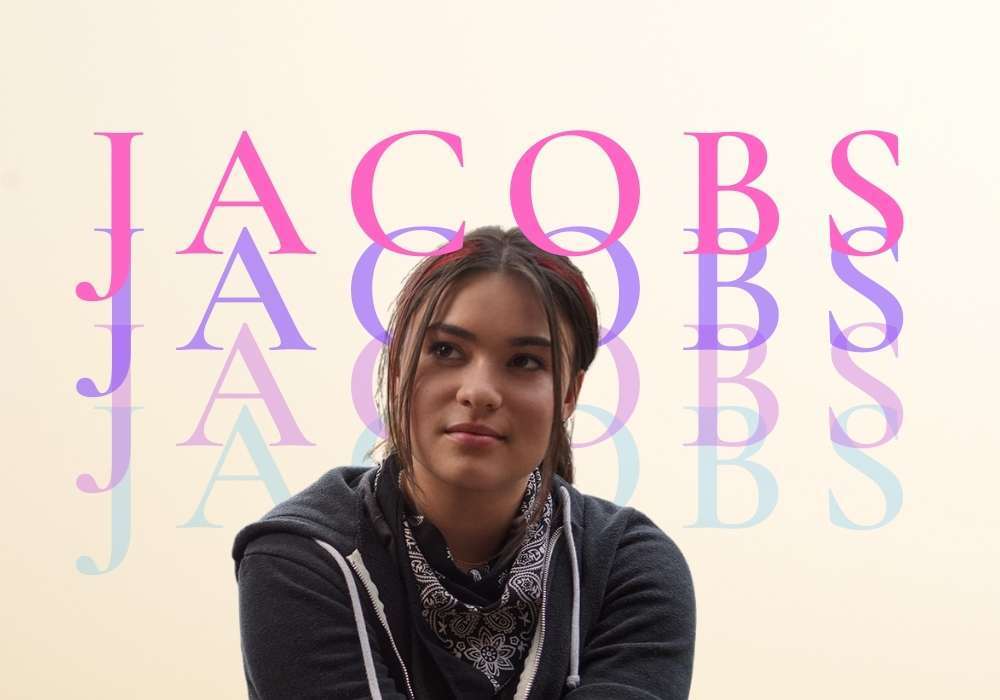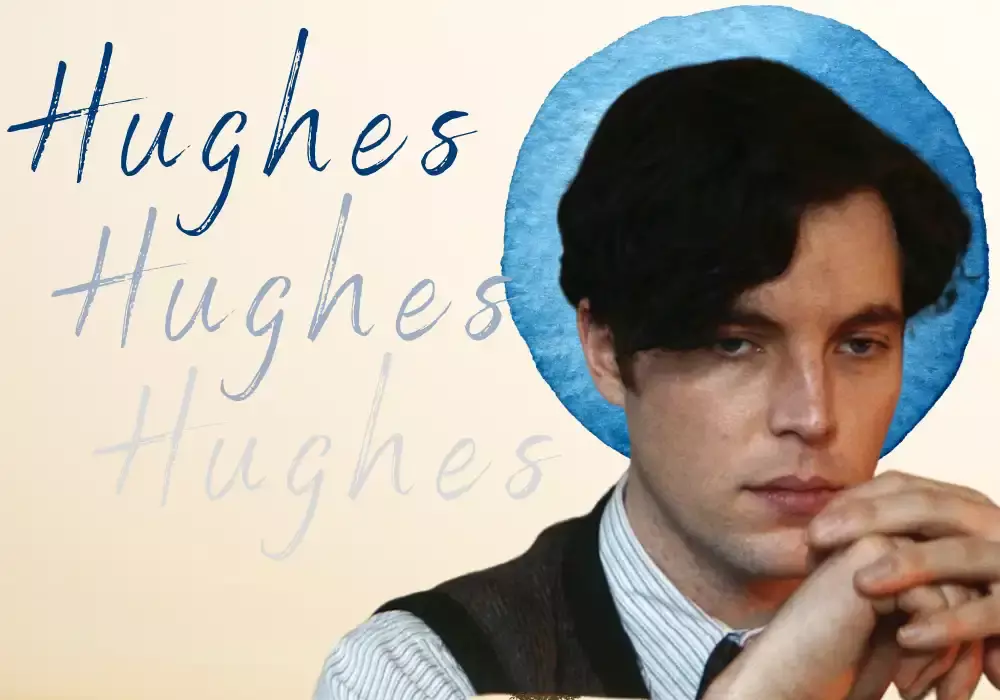Mamoudou Athie’s star is on the rise, from indies like Unicorn Store and Uncorked, to the recent Netflix series Archive 81, to the upcoming Jurassic World: Dominion. Here, he discusses his career to date, including his standout knack for creating chemistry with other actors.
Read more of our in-depth profiles of emerging actors here.
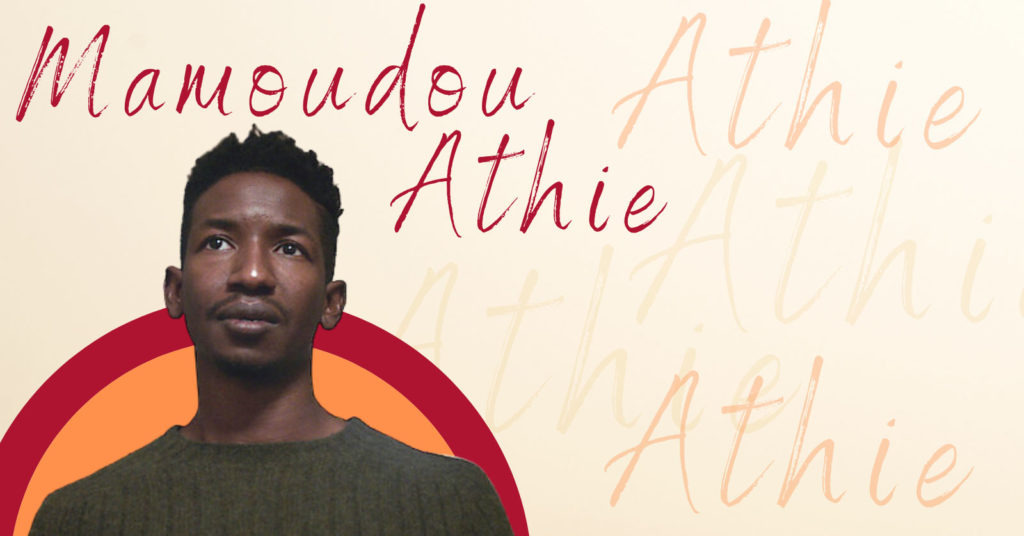
Discover one film you didn’t know you needed:
Not in the zeitgeist. Not pushed by streamers.
But still easy to find — and worth sitting with.
And a guide to help you do just that.
When I first saw Unicorn Store (Brie Larson, 2018), I quickly became convinced that Mamoudou Athie was Hollywood’s next rom-com leading man — at least, if Hollywood knows what’s good for it. He plays Virgil, a skeptical but kind handyman tasked with building Kit (Larson) a stable for her unicorn; the two quickly fall into a sweet and sincere flirtation. Unicorn Store’s romance is only a subplot, so Athie’s role is small, but the way he conveys warmth, humour, and a genuine care for and desire to listen to Kit makes it easy to fall for their relationship. Their chemistry is so casual and seemingly effortless that I asked Athie if any of their dialogue was improvised; he remembers the film being quite tightly scripted. It’s a testament to Athie’s ability to create the impression that his character is discovering a genuine and exciting connection, as if in real time.
I haven’t gotten the slew of Mamoudou Athie rom-coms that I wished for… yet. The first step is for Hollywood to start actually making those kinds of films in large quantities again (I’m waiting). But I’ve still been impressed with him in whatever parts he’s taken, particularly in what I’ll call chemistry scenes: dialogue-heavy scenes where the focus is observing two characters’ relationship, whether romantic or platonic, that lives and dies on Athie’s patter with another actor. He brings a similar lightness and gentleness to the romantic scenes in Jean of the Joneses (Stella Meghie, 2016) and Uncorked (Prentice Penny, 2020), making those scenes pop even though they’re not the centrepiece of the film.
I’ve followed Athie’s work closely, as he’s made his name in small roles in decently-sized movies (The Front Runner, Underwater), big roles in small movies (Uncorked), and even got an Emmy nomination for Outstanding Actor in a Short Form Comedy or Drama Series for his comedic performance in Oh Jerome No. Throughout, his earnestness, warmth, and openness as an actor has stood out. It’s fitting that, in Oh Jerome No, he plays a man with an absurd inability to keep his emotions in, who keeps getting in trouble by telling multiple women he loves them on the first date.
It’s not just the warmth in Athie’s eyes or voice, but his ability to talk with his whole body, that makes it so easy to connect with his characters’ emotions. That’s true in the absurd OTT context of Oh Jerome No, where he’s playing everything big. It’s also true of Athie in real life: he’s an open and warm conversationalist who gestures a lot to illustrate his speech. His range is evident in roles when he uses his expressive physicality in different ways to convey introverted characters in more dramatic roles. Take the TV drama Sorry For Your Loss, where he plays a suicidal man who is keeping up a warm and happy facade for his loved ones. Most of the time, we see him through the eyes of his wife, to whom he oftens speaks warmly and smiles for, but the way Athie’s posture seems inward and slack, his voice soft and tired, hints at someone who’s privately exhausted and struggling.
Archive 81 was the occasion for my speaking to Athie, and it feels like an unusual, new kind of role for him. As someone who’s long admired Athie’s ability to spark with other actors, it was amusing that, when I finally got to speak to him, it was about a show in which he’s mostly completely alone in a room. Athie plays Dan, a withdrawn archivist living in New York City who gets a job restoring old VHS tapes for a mysterious, extremely rich man. He’s sent off to a remote house upstate and spends hours watching tapes from the ‘90s of a young woman named Melody (Dina Shihabi), who was making a video document of her research on an old NYC apartment building. Through Dan’s eyes, as he discovers Melody’s footage, a mystery unfolds that ties the two of them together.
Despite not even having all the VHS footage to react to on set, because it hadn’t been shot yet, Athie still makes compelling work of countless scenes of Dan simply watching the tapes intently, getting more and more wrapped up in Melody’s life. It’s the work of an actor who is a compelling listener, even when he has to imagine the thing that he’s listening to because it’s not physically there. In most of these scenes, the only living scene partner he has is a small rat that Dan finds in the house and keeps in a cardboard box, occasionally chatting to.
Athie and I covered a lot of ground in our conversation, from how he got his start in acting, to what keeps him going, to his love of Shakespeare and anime. I wanted to get to the bottom of what his secrets are for creating such lively chemistry with his fellow actors, and whether a future of Mamoudou Athie rom-coms might be in store. As well as covering his whole career, we spoke specifically about Archive 81 and the challenges posed in the shoot, and touched on what’s in store for him in the future, including the new Jurassic World film that he shot in 2020.
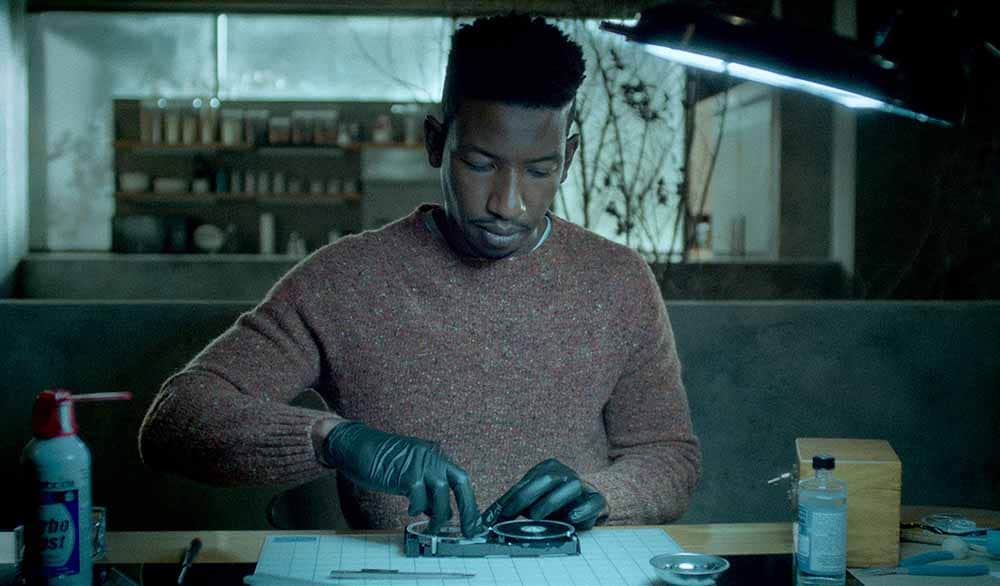
Seventh Row (7R): How did you get interested in acting?
Mamoudou Athie: Oh gosh, it’s so ridiculous. I just started by imitating my sister. It wasn’t even like she was doing plays or anything. I was just imitating her conversations. I think she was getting annoyed because I was copying her and everything that she had said. I got bored of the game, I became an actor, and here we are! That is the beginning of the seed being planted, as ridiculous as that is.
I went up through high school, and I just was like, “That seems fun,” but I was never really committed to it. Then, I went to this [college] which will remain nameless — it’s not the best institution. [It’s a] school that will pretty much take anybody in. This was the type of school that was just like, “We’re taking your money.” And I wasn’t invited back after the first year because I was such a terrible student. Then, I was like, well, do I want to do this? Because I just spent a year fucking around. I went home — I was eighteen at the time — and I thought about what I wanted to do. I was like, you know what? I’m gonna do this.
I ended up going to the William Esper Studio, which was where I legitimately fell in love with acting. Suzanne Esper, she’s the best. I just got obsessed. I’d hang out with my friends and everything, but I just was super myopically focused on acting: plays, readings, anything that I could go to, I would go to. I don’t know if I’d have the stamina to do it now.
I graduated and then would just wake up at 4am to get seen at open calls for equity productions. I did that for at least a year; I just continued with my hyperfocus. But I started to see plays and [feel like], I can do that. I’m capable of doing that. But I don’t have the skillset. I don’t have the hard skills to perform a musical, or certain dialects. There were certain tools that I felt I was missing.
I’d seen a lot of the same schools attached to these [performers], and they were Juilliard, NYU grad program, and Yale. I saw Yale’s showcase, and I was like, that’s it! Whatever these guys got going, I want all of that. They didn’t feel uniform; they felt like they were all individuals. They all felt really good in very distinct ways. I remember I ran into Winston Duke, because I was thinking about auditioning, and he had just gotten in. He hadn’t started yet. I was so overwhelmed by the odds: everyone auditions, and sixteen, or max eighteen, people get in. He said “Well, Mamoudou, somebody is gonna get in, why not you?”. That was a mantra that I repeated in the year I spent preparing.
I got in and spent three years there. [It was] really challenging. I grew up a lot in those three years. My final year is when I felt I learned why I wanted to be an actor. We did this play called The Visit, directed by Nicole Lewis, who is Canadian. She’s the best; she’s teaching over there now. It’s just this beautiful, human play The conversations that I had after it were the types of conversations that made me feel, “Oh, this is useful.” There are other plays that I was in where I just felt a little like, what’s the point of this? But [The Visit] made me realise my purpose and my love for [performing]. It felt vocational rather than that I’m just obsessed with this, and who knows how long this will last? [After a performance] people would talk to me with this look in their eye about this play, about people and greed and money. I was like, that’s it. That’s the utility of this profession.
7R: You mentioned not having the skill set to do a musical. Do you have it now? Can you sing and dance?
Mamoudou Athie: I’m just thinking out loud, because my friend Mitchell, who legitimately is a musical theatre guy — I went to school with him. He would be like “Fuck no.” [laughs] But I think I could, absolutely. I definitely know how to begin. I’m gonna have a shot at it, for sure.
7R: It sounds like you had a long education. What do you think you got out of drama school and training? And since you’ve had three different versions of it… what makes a good drama school education, versus a bad one?
Mamoudou Athie: It was fascinating to be able to compare those experiences. I think a good one is one [where] you don’t feel reliant on anyone. There is a kind of teacher who makes you feel you need them to do your job at the highest level, whereas a good drama school will give you the tools so you can rely on yourself.
Ron Van Lieu was the head of my program when I was there, and he’d always say, “You’ve got to have a good internal barometer to know when you’re doing good work, because sometimes, you can trick yourself into thinking you’re doing all this fabulous shit and you’re not.” It’s so funny. He’s right! A good school is a place that gives you the tools to be able to tell that you have a strong, solid process, and if you put yourself into that process, then you’re going to be okay.
And, hopefully, a good drama school doesn’t traumatise you, because some people think that’s acting training, and it’s fucking not.
7R: Have you done much theatre since this transformative experience with The Visit?
Mamoudou Athie: I’ve done a couple of plays. I haven’t done a play since my first year after graduation. I spent a lot of time doing a lot of TV and film. The last play I did was The Mystery of Love and Sex at Lincoln Center Theater, which was a dream. That was 2015. I remember doing that play at Lincoln Center, and I was working with Diane Lane, who I love, [as well as] Tony Shaloub and Gayle Rankin. Sam Gold was directing, and Bathsheba Doran wrote the play. People that I was a fan of already.
But I was like, “But I’ve still got to pay my student loans!” [My college loans were] Parent Plus loans, in my parent’s name, and the time had come to pay my parents back for all the support. Honestly, I’d always wanted to do TV and film; that’s what got me interested in acting. I didn’t see a lot of plays growing up. I love it in a very different way. But I have been itching to do a play. It’s on the mind. I just want to do it with the right people, the right one. Otherwise, what’s the point?
7R: You say you love it in a very different way. In what way do you love theatre?
Mamoudou Athie: There’s this adage that the theatre is the actor’s medium. It’s true to a point. You still have a director and a playwright, but you know that, once you’re up there, it is on you. Whereas with TV and film, you provide the raw material, and then [it is] sculpted. I enjoy both ways, but it’d be nice to flex in that fully realised sense… well, that’s not really the phrase I want to use, because you can be fully realised in film. But you know what I mean.
7R: It’s just you on stage, there’s no cutting.
Mamoudou Athie: And sharing with other actors in the moment. There’s no break. You’re living through the [story] moment by moment by moment, and then at the end of the night, you do it again and see what else you can do.
7R: I think I heard somewhere that you performed some Shakespeare on stage. Do you like that kind of text work?
Mamoudou Athie: I love Shakespeare so, so much. It’s my favourite. It’s hard to beat. There are wonderful writers, a lot of indie writers, but Shakespeare has lasted so long for very good reason. I feel he invented half of the English language, at least colloquialisms that we use.
7R: And storytelling structures.
Mamoudou Athie: Exactly. There’s so much there. The density of the language and the alacrity needed to convey those thoughts in a crystal clear way. There’s something about it when you do that that is so fulfilling. If you trust his language, it’ll just take you there. You hear that all the time, but it is true. You’re not trying to force something; just swallow the text. It’s just so fun. It’s so fun. I can’t wait.
7R: Someone needs to cast you in Shakespeare stat.
Mamoudou Athie: Hey, we’ll figure it out one of these days. Hopefully soon.
7R: I imagine a benefit of going to drama school is it places you within a community of other actors who are probably quite close in age. What have been the benefits of that for you?
Mamoudou Athie: Real friendships. I think the business, and the society we live in, engenders competitiveness. That is, I think, unnecessary, and to have friends that are like-minded, with similar hearts, sharing a particular journey and supporting one another, is invaluable. I don’t know what I would have done without my friends that I went to school with, because it’s really hard to go it alone.
Technique
7R: You talked about how going to drama school was also about creating a toolbox for yourself. What is your technique or approach as an actor, if you can summarise it?
Mamoudou Athie: It all starts from the facts of the script. I just glean everything that is factual about a character and their circumstance: what they want and who they are. From there, the imagination fills that out.
I always want to [understand] what they want, in the overall sense, and then, from there, get more specific down to scenes, and sometimes, down to moments, if something’s unclear. Physical behaviour has to come from the situation of the text, because otherwise, it’s just somebody trying to be interesting, which is just embarrassing to watch, for me anyway.
I do my best to make it as simple as possible, so no matter what, I have my lodestar. I have something very, very clear that I’m always in pursuit of, no matter what’s going on. That’s when you’ve figured something out about the character, when everything’s crystal clear, no matter what. Even if he says he wants this, there’s always some indication that tells you what they [actually] want.
We used the term super-objective in my school. If somebody wants respect, what [kind of] respect? You want the respect of the paragon of a hard-working man? Let’s take The Front Runner. I’m playing this guy, AJ Parker. I think the objective was to be a beacon of truth. We always want it to be poetic, so you can have something to aspire to. It sounds highfalutin, but then you just [break it down to] the meat and potatoes.
He wants to be friendly with this guy that he respects, Gary Hart, so there’s a conflict of interest in like, I’m going to expose this guy, but at the same time, I want to be friends with him. I want to be cool with this guy. I want him to be President [of the USA]. I vote for him. But because my super-objective is what it is, I can’t go against that, so I’ve got to do what I’ve got to do, even if it is at odds with what I want to do. That’s the thing that tethers you, no matter what, because that is what his life objective is.
7R: When it comes to the way that your character moves and speaks, is it all about understanding that objective and then feeling it in the moment? Or is there much planning that goes into that?
Mamoudou Athie: It depends. If there’s, let’s say, an injury, that takes care of that. It depends on their environment, and how susceptible they are to their environment. Are they the black sheep? Or are they somebody who falls in line with the rest of the flock? Who are they? How do they handle situations? How are people responding to them when they see them? That informs that exterior stuff, but the rest of it is just, what is the simple truth?
One of my favourite actors ever is Sally Hawkins, because you can see her soul. I think there’s something really beautiful about somebody who strips it all away. I had seen her in four movies, and I was like, “That’s the same person?!”. But even still, no matter what, you can see her doing something very truthfully and simply and sharing it.
7R: Have you seen Happy-Go-Lucky? Are you a Mike Leigh fan?
Mamoudou Athie: I love Happy-Go-Lucky. You know, I should watch more of his movies. I haven’t seen a lot of his movies.
7R: I’m always curious how costume affects an actor’s performance. You have all your ideas for this character, but when you put on the costume, someone else has had their ideas, too, and you’re inhabiting that.
Mamoudou Athie: For me, it’s everything in the details of how they wear their clothes; are they wrinkled? It says a lot about a person, especially if you want to spend two hours or an hour and a half with a character. Who is this person? You want to make it very specific, nothing general about it, because it helps the actor and it also helps the audience.
I’ve never met a costume designer that wasn’t specific. But, sometimes, it’s just a good conversation that comes out of multiple fittings. Sometimes, I enjoy the costume fitting process, because it helps me get clear to myself as I’m talking, “Oh, wait this isn’t the right [direction] even though I thought [it was],“ and we just continue to build the character together.
Picking projects
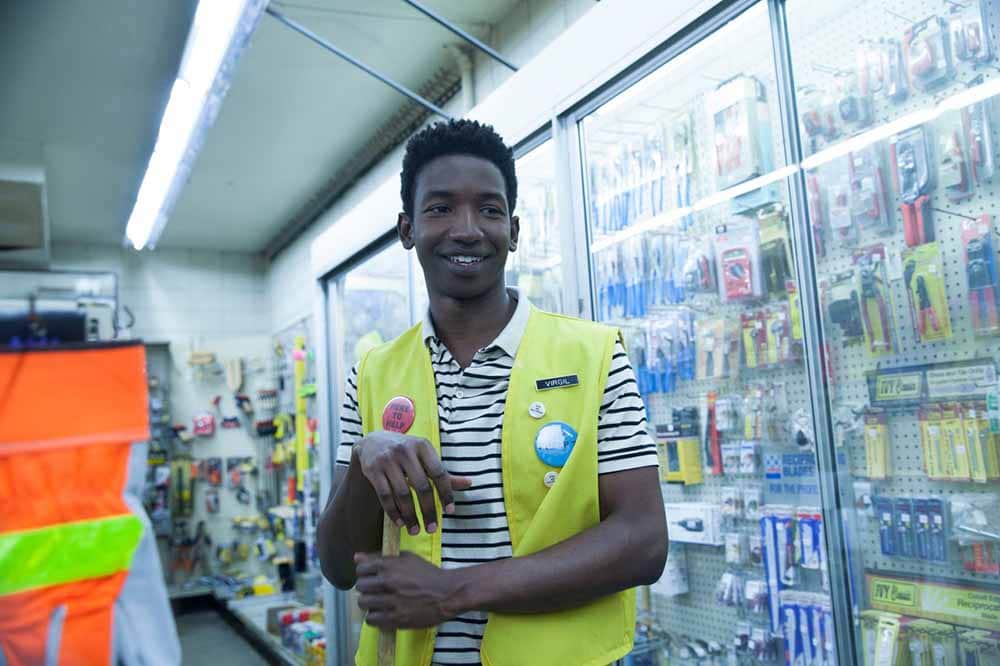
7R: What attracts you to a project? Or, as an actor, what projects do you aspire to be in? You talked about how The Visit was something that was thought-provoking and started a conversation. What are the stories that you are interested in telling, and provoking conversation around?
Mamoudou Athie: Actually, I’ve been pretty fortunate, thank god. I can answer this question pretty simply. There are a couple of things that can attract me. Sometimes, I just want to work with this person I have been dying to work with. If somebody offered me something and I see Sally Hawkins’s name on it, [I’m] probably saying yes, because I think that’s such a rich experience: to be able to learn from somebody like her.
But more often than anything, what are we trying to do here? What is the point of the story? [Does] this cast a different light that one wouldn’t expect, that can make people see things a little differently, or people a little differently? Sometimes, it’s as simple as a really beautiful conversation. I think, fundamentally, it’s what appeals to… well, humanity. Humanity is that thing that I’m excited by. More often than not, [I’m attracted to] something that I feel is useful.
I remember when Uncorked came my way, and I was so grateful that [writer-director] Prentice [Penny] wanted to cast me, because it felt useful. When we had a conversation, I was like, I just want a simple story about a Black family. It’s this strange story about this kid who wants to be a sommelier. It’s just a family story, you know, no trauma. Well, there’s some trauma in the movie.
7R: But it’s an everyday kind of trauma that everyone experiences at some point.
Mamoudou Athie: I thought it’s important. Yes, Black people have lives, [their race] doesn’t have to be the sum of the stories. I was getting a lot [of that] in my mailbox; it was intense. We have just lives, everyday lives. I think those should be shown and celebrated. That was a really important thing for me. I love that he showed that sentiment. He had that sentiment and wrote a movie, and a whole show, Insecure, with Issa Rae. I just liked what this guy’s after.
And The Front Runner, I was like, wow, this is how we got here. The press machine that celebrates shit. That’s just like, what are we even doing here? What are we putting on the news? What’s going on here?” There’s something salacious about [showing] the beginning [of that].
And Unicorn Store, which is one of my favourite movies ever, I love it. I just thought it was so beautiful and so tender. I was like, this needs to be made, for me, at least. It just meant so much to me. It’s one of my favourite experiences I’ve ever had acting. I think it’s really special.
7R: I hope Brie Larson directs something else. I’m also a big fan of that film.
I feel like, straight out of the gate, you were working on some really interesting projects with really interesting directors. A lot of debut directors, too!
Mamoudou Athie: Yeah, I know!
7R: I love Jean of the Joneses. That was great. And that was Stella Meghie’s first film, right?
Mamoudou Athie: Yeah, that was her first feature for sure. I think we did that for a million bucks in Toronto. It was so crazy. It was fun working with her.
7R: It’s great. That and Unicorn Store, they’re both first features, and at the same time, you were doing The Get Down, which must have been very big, wild production to work on. I’m curious about what you learned from some of these early projects about what you, as an actor, like in a working environment?
Mamoudou Athie: I just like a good time, and a lot of that involves a simpatico and like-mindedness. That includes how you treat people and just the vibe on set that’s created. And good leadership. With Unicorn Store, I would have done that for free. I was honestly just happy to be there. And when you’re in a space like that with people who also appreciate you being there, even though I was three years out of school, it was like, this is one of the reasons I love being an actor: we just want to make good work, and we like each other. It just makes the job easier.
I learned a lot from Prentice [Penny] and Jason [Reitman]. Not only the experience of those movies, just watching and seeing how they talk to people and seeing how the set is running. And the faith that they have in you, in some of these projects, with people that you’ve admired for so long. It goes a long way. It builds up confidence that I’m eternally grateful for. Even if I never work with any of those guys again, they believed in me, and I feel it.
7R: Now you’ve done this big Jurassic movie. That must have been a very new experience.
Mamoudou Athie: That was wild. There were things in that movie that I was like, man, I see where the money’s going, this is crazy. It’s such a massive ensemble movie.
7R: Are you interested in continuing to work in the blockbuster space?
Mamoudou Athie: I will be honest, when I first started working as an actor, I was completely uninterested. But it depends on who and what. I wouldn’t just say no to something because it has a big budget. I think that’d be a little naive. I’m glad I did Jurassic World because, actually, it does mean a lot to me. Even the story itself, disregarding the legacy [of the franchise]. So many of those people, so much of that cast, are people that I’ve admired forever. I wouldn’t trade that opportunity.
7R: Thinking about the films and TV that you’ve done, you’ve played some very specific professions. You’ve been a sommelier in Uncorked, an archivist in Archive 81, a DJ in The Get Down, and a musician in Patti Cake$. They’re not skills you can just pick up anywhere, by chance. Do you find that fun and interesting as part of the research process?
Mamoudou Athie: The archivist one is a little less fun if I’m being honest. I got to Pittsburgh [to shoot Archive 81] four days after I wrapped Jurassic World: Dominion. They gave me time to get back on schedule, but just preparing for that was pretty tedious work. It’s a lot of mechanical things. I just needed to learn the basics to get it across. But being a sommelier for a moment, or being a DJ… that changed my life. Being a DJ changed my life because I learned I had no sense of rhythm before. DJ Scratch Academy and Grandmaster Flash himself taught me.
7R: Well, now you have the rhythm to be in a musical.
You’ve dabbled in producing, right? Is it something you’d like to do some more?
Mamoudou Athie: Well, that’s a stretch. [laughs] [But I] must do. It’s not an easy thing to do, and it seems like a real pain in the ass. But if you want to tell the stories that you want to tell, and not just wait by the phone or computer, sometimes, you’ve got to make the opportunity for yourself, or other people, and do it.
Right now, I’m talking with some friends about this movie that came my way. It’s about this Mauritanian man, based on a true story, and I just think it’s really beautiful. It’s a podcast. It’s literally a story about my homeland, and it’s a son in search of his father, and who he was, and who he is. I think it’s really beautiful.
7R: So you’re hoping to produce that?
Mamoudou Athie: Well, I’ve got to make it happen. I can’t tell you how much I’d regret [not doing] that. And every time we get a little overwhelmed [I just think], “Mamoudou, if you let this opportunity pass up, you will regret it.” So, I’m thinking about that.
The key to creating chemistry
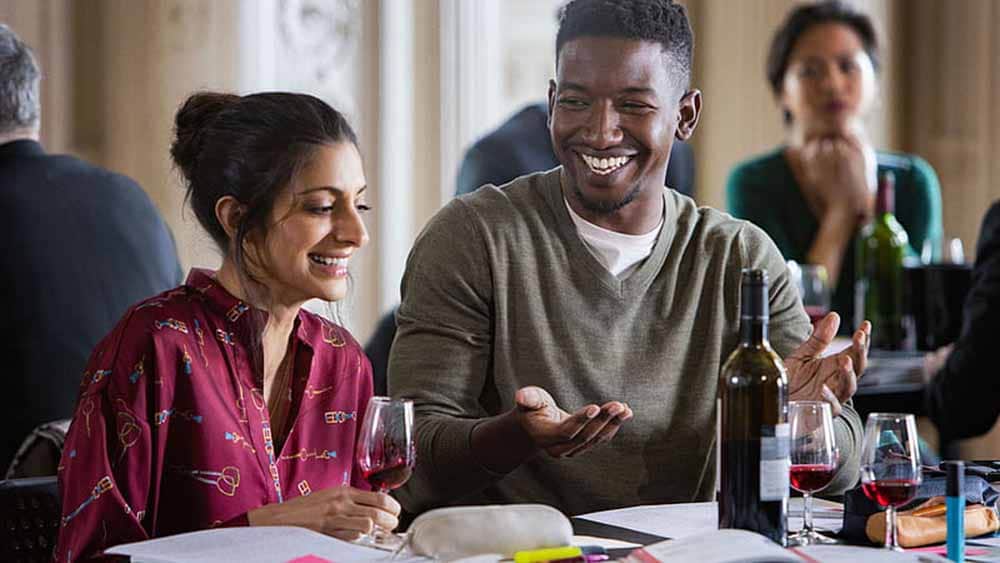
7R: The first time I took note of you was in Unicorn Store, which I loved. What struck me was I think you’re good at playing in that rom-com mode of bouncing off another actor. You and Brie Larson have such good chemistry in that film; you’re both really charming with each other. I’ve seen you in a few other films where a lot of your role is to provide energy for the other actor to bounce off of, like Jean of the Joneses. It made me think that you should make lots of rom-coms.
Mamoudou Athie: I recently had a conversation with another interviewer, and I said it then: I love rom-coms, a lot.
7R: I think some actors think they’re above that thing,
MA: Oh, what?! When Harry Met Sally is the gold standard. I’d love to do something like that. That kind of writing? Forget about it. They’re so fun. And they’re sweet.
7R: I think it takes a lot of skill to do those films well. When you’re playing against another actor, how do you create energy or give them something to work with?
Mamoudou Athie: I appreciate this question. I remember I had to do something with someone, and I feared that we didn’t have any natural chemistry. This was very early on. I actually happened to go back to school to see Ron’s [Van Lieu] class. He just happened to be working on a scene, and he started talking about chemistry. He starts talking about what chemistry means. Let’s say some people, from out of town, are coming to New York and seeing a play, and the play is cool, but [they think that] those two [actors] didn’t seem to have a lot of chemistry. They were good [individually].
What that means is that that actor was going to do what they were going to do, and that [other] actor was going to do what they were going to do, and nothing was happening in between. They’re not trying to communicate. They were locked into their ideas, as opposed to sharing, and letting it go somewhere else. Something about that really spoke to me. I have to be honest, I did have a lot of ideas that just got in the way. If I just fully open up and listen to whatever is going on, that should take care of itself. And I think it did.
I think that’s just the foundation of good acting: getting your ego out of the way, and just listening to someone else; just trying to connect.
7R: In chemistry scenes, do you see your performance as just as much about providing material for the other actor to work with as it is acting for yourself?
Mamoudou Athie: For me, you give what you want to get, and you want to give your all every time, whether you’re on camera or not. You hear stories sometimes about actors just not being there. I even heard that recently [about an actor who] leaves set. What do you mean? That’s crazy that that’s even allowed. But whatever. Sounds like a nightmare.
Mamoudou Athie on Archive 81
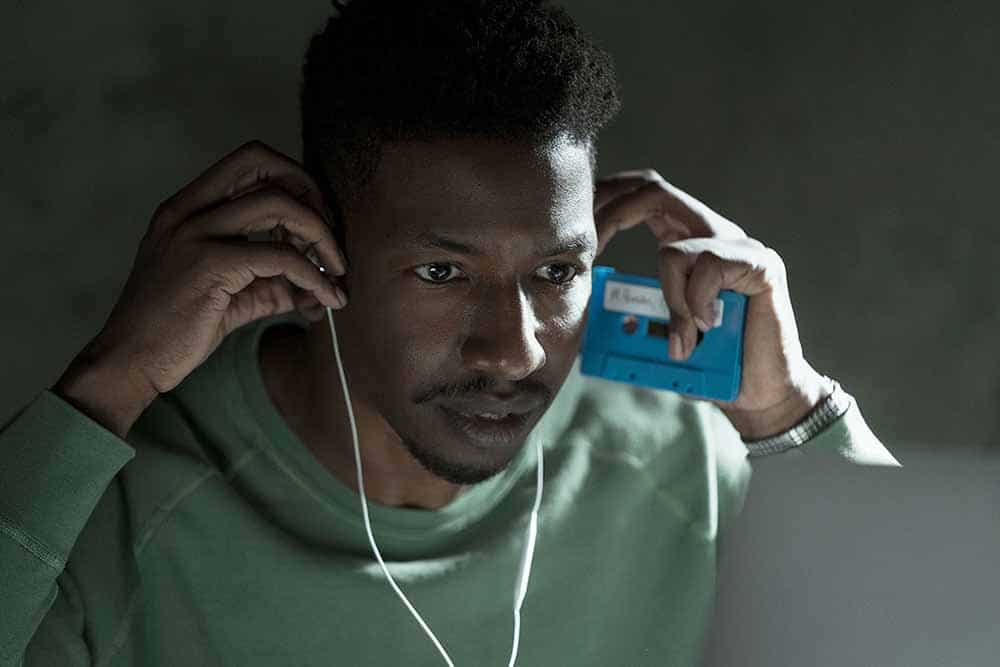
7R: What attracted you to Archive 81?
Mamoudou Athie: I loved the character. I wanted to work with [director] Rebecca Thomas because she did this movie called Electric Children. And I was familiar with [writer and showrunner] Rebecca Sonnenshine’s work more recently because of The Boys. Some of her episodes in season two, there’s some really moving stuff in there. I saw her name [attached to the project] I was like, yes!
7R: A lot of the show is just you in a room watching videos. And I heard you didn’t even have all the footage to watch when you shot those scenes!
Mamoudou Athie: That was a fun challenge, in a sense, or it was a fulfilling challenge.
7R: How many shoot days were there of just closeups of you watching a screen?
Mamoudou Athie: Way more than I thought. Way more. I was like, oh, okay. Right. I should have known, that makes sense. But for some reason I didn’t anticipate it being so much.
7R: Is it a difficult task to keep track of what you should be reacting to, and your character’s arc, so that you don’t just have the same three facial expressions on a loop.
Mamoudou Athie: That all comes from having the script and really defining who the guy is and what things mean to him. I’m not watching the same thing over and over so I’m not worried about what my face is doing. I’m just worried about what I’m seeing. Sometimes, they would have some footage for me to watch, which takes care of itself. I’m not going to be pulling faces to be interesting, I’ve just got to watch it and let it affect me. There’s nothing I can do about it. If I’m fully available and open — and I think Dan is a hypersensitive man — then that’ll read.
If there’s a blank screen, my imagination is a pretty potent tool. So I can just imagine whatever and make it fuller and more vibrant for me to get to the story we are trying to tell.
7R: How long was the shoot overall?
Mamoudou Athie: Six months.
7R: Just after the Jurassic movie, as well.
Mamoudou Athie: I took a long break after that. I needed it real bad.
7R: I thought it was very clever of the writers to give you a rat to act against. It gives you those chemistry scenes!
Mamoudou Athie: Does it? I’m glad people enjoyed it.
7R: What was it like acting opposite a rat?
Mamoudou Athie: I don’t like rats.
7R: You don’t like rats? I used to have pet rats. That’s a funny scene partner to have if you don’t like rats.
Mamoudou Athie: I will say, Princess — that was the rat’s real name — was a very sweet rat. But even still, it’s a rat. It didn’t know we were doing scenes, it was trying to get out a box or doing whatever it wants to. But there was a sweetness to that rat. If there was any rat that I’d have to work opposite, it would be that one.
7R: That’s good to hear. They’re not giving you much in the scene, unfortunately.
What you were talking about earlier — your process of finding the thing that your character wants above all else — is very clearly written into the script of Archive 81. The show gives you what a lot of horror stories don’t make clear: a reason the character is persisting despite how dangerous of a situation they’re in.
Mamoudou Athie: Absolutely. Otherwise, it’s ridiculous. One of the things I loved about the script is how romantic it was. This is a guy who lost his family at a young age; he’s still stuck in [the past]. He has a Walkman. He works with old artefacts. He is a man stuck in time, and he’s obsessed with time. His job is to restore things that are lost for other people. How beautiful is that? That’s something that I was taken by.
When he has the opportunity to do that in real life, it’s like, this is one of the few characters you’ll ever play that gets to fulfil his super-objective. It’s this thing that he’s wanted to do his whole life, and he gets to do it. I’d hope he reads as a different guy in the last few episodes, as opposed to the first episode. There is this fire that’s lit in him that’s a little quiet at the beginning. I love that.
7R: I noticed you’ve worked with Matt McGorry twice now. I thought he was great in the show, and you two are so much fun together. I need a buddy comedy movie now!
Mamoudou Athie: I love buddy comedies. Butch Cassidy the Sundance Kid is one of my all-time favorites.
7R: Let’s find a buddy Shakespeare movie for the two of you.
Mamoudou Athie: [laughs] I’m trying to do that with my buddy Yahya [Abdul-Mateen II, whom Athie became close friends with in drama school], I would love that.
7R: I’m assuming it’s a process now of just waiting to see whether season two is happening?
Mamoudou Athie: Yeah, but you know, it’s out of my hands. I’m blessed to be able to forget about that stuff sometimes.
What’s next for Mamoudou Athie?
7R: What is your taste in film? Who’s making films right now whose approach you admire, or might like to work with?
Mamoudou Athie: I go through phases where I’m just obsessed with film. And I’d say film definitely more than TV. But I actually watch a lot more anime than anything. There’s some directors in anime that I’m obsessed with. Makoto Shinkai did this beautiful film called Your Name. There’s a parallel between that and Archive 81 that I love. There’s so much heart in some of these [anime] stories, and the world-building in some of these stories… like Cowboy Bebop is my favourite series ever.
My acting teacher would talk to us about playwrights, and they’d say that these playwrights all have their distinct obsessions that they just can’t get over. They’re obsessed with something, and there’s always something that they’re always about. Whether it’s Chekhov, August Wilson, or Caryl Churchill, there’s always something very consistent in the work. Tennessee Williams, in particular, is the person who comes to mind when I think about an obsession. I feel the same way about this guy Shinichirō Watanabe, because every single film has some kind of merging of styles, but there’s always this wistfulness, this bittersweet humanity to everything that he does. Just wonderful.
7R: Are you someone who would one day want to write or direct, or are you just happy being an actor?
Mamoudou Athie: I know what it takes to write something just from the outside. Actually, I don’t know what it takes. But from the outside, Jesus. Directing… a little later. It is so much. I see what some of my director friends go through and I’m like, Jesus Christ.
7R: What are you working on next?
Mamoudou Athie: I’m shooting a film [very soon] called The Burial. I’m looking forward to it. Actually, Maggie Betts is directing it. She directed Novitiate, which is beautiful. I want to work on this movie just because of her. I’m glad she wants me to do it, as well. If you watch that movie, you see that thing that I’m obsessed with, this humanity, this tenderness, this… it’s just moving.
We want to make sure you don’t miss out on any opportunities to watch great films featuring great performers like Mamoudou Athie at virtual cinemas, VOD, and festivals throughout the year.
Subscribe to the Seventh Row newsletter to stay in the know.
Subscribers to our newsletter get an email every Friday which details great new streaming options in Canada, the US, and the UK.
Click here to subscribe to the Seventh Row newsletter.
